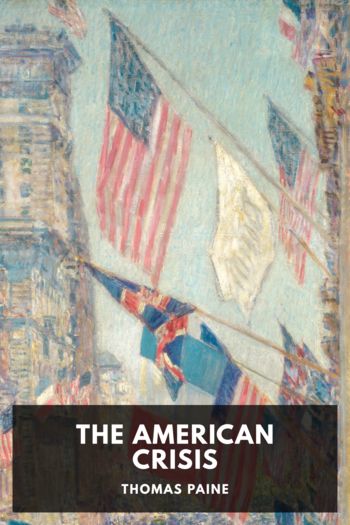Fateful Lightning: A New History of the Civil War & Reconstruction, Allen Guelzo [best thriller novels of all time txt] 📗

- Author: Allen Guelzo
Book online «Fateful Lightning: A New History of the Civil War & Reconstruction, Allen Guelzo [best thriller novels of all time txt] 📗». Author Allen Guelzo
Lincoln was not at all averse to being measured. As early as February 1860 he admitted to his friends, “I am not in a position where it would hurt much for me to be nominated on the national ticket,” and on February 16 he was pleased to find that the Chicago Tribune had openly endorsed him for the Republican presidential nomination, claiming that only Lincoln could carry the western states for the Republicans. The crucial test for Lincoln was the New York invitation, for this would clearly be his debut before the Republicans’ East Coast party moguls. On February 27 about 1,500 New York Republicans turned out to hear Lincoln speak in the Great Hall of the Cooper Institute.
His address started poorly. Tall, gaunt, his wrists dangling out of his sleeves, Lincoln spoke in a shrill Kentucky drawl that made sophisticated New Yorkers wonder whether a terrible mistake had been made about this man. After a few moments, though, Lincoln warmed to his task, and in a short while the silent crowd turned increasingly more enthusiastic. He addressed himself first to Stephen A. Douglas, underscoring once again that the intention of the framers of the Constitution was to see slavery contained and gradually extinguished rather than given the tacit approval of the popular sovereignty doctrine. “Those fathers marked it,” Lincoln insisted, “as an evil not to be extended, but to be tolerated and protected only because of and so far as its actual presence among us make that toleration and protection a necessity.” Lincoln then turned to the Southern disunionists and warned them that the Republicans were not going to be frightened out of their principles simply because the South held the pistol of political disruption of the Union to their heads. Republican opposition to slavery was a matter of moral judgment, not just political expediency. “All they ask, we could readily grant, if we thought slavery right; all we ask, they could as readily grant, if they thought it wrong,” Lincoln explained, “Their thinking it right, and our thinking it wrong, is the precise fact upon which depends the whole controversy.”63
Yet Lincoln tempered his utterances with a large dash of caution. He insisted that he only wanted to contain slavery where it was, not to abolish it outright. “Wrong as we think slavery is, we can yet afford to let it alone where it is, because that much is due to the necessity arising from its actual presence in the nation.” And he distanced himself from John Brown by referring to the Harpers Ferry raid as “peculiar” and “absurd.” In short, Lincoln said everything he needed to say to make clear his moral opposition to the extension of slavery, while at the same time professing no personal animosity toward the South. Gone was the provocative rhetoric of the “House Divided” and the talk of conspiracy between Buchanan, Pierce, Douglas, and Taney—Lincoln as much as conceded that the house could remain divided so long as one of the divisions could not expand, and in so doing he positioned himself as a firm but not radical anti-slavery man, the perfect Republican. The Cooper Institute audience roared its approval, and so did the major Republican newspapers.64
The greatest impact of the Cooper Institute speech would be felt in Illinois. On May 9, 1860, the Illinois Republican state convention at Decatur riotously pledged its national convention delegates to Lincoln for the presidential nomination, and at the height of a tremendous outburst of enthusiasm, Lincoln’s cousin, John Hanks, paraded into the convention, bearing two weather-beaten fence rails bedecked with a banner reading: “Abraham Lincoln. The Rail Candidate for President in 1860. Two Rails from a Lot of 3,000 Made in 1830 by Thos. Hanks and Abe Lincoln.” Though Lincoln had struggled all his adult life to put his crude origins out of sight and deeply resented anyone’s attempt to address him informally as “Abe,” the state convention saw at once the value of identifying him as a man “fresh from the people,” especially the people of the pioneering West, and so he became not Mr. Lincoln the railroad lawyer or the Honorable Abraham Lincoln, Esq., of Springfield, but Abe Lincoln the Rail Splitter.
When the Republican national convention convened one week later in Chicago, most of the delegates arrived at the convention hall assuming that either Seward or some other party stalwart would be handed the presidential nomination. But Seward’s reputation as a radical, unelectable in the West and anathema to anti-slavery Democrats, crippled him. The first ballot had Seward only sixty delegates shy of the nomination, but from that point on, the Illinois contingent (which already had been agitating and bargaining for their favorite son for weeks) now began wheeling and dealing in earnest while Lincoln remained in Springfield so as to be able to turn a blind eye to the politicking the Illinois Republicans were waging in his behalf. On the third ballot Lincoln landslided into the nomination, and the convention exploded into





Comments (0)